Guest post by Leah of The Lobster Dance, a blog about Japan, gender, media, and culture (with a heavy dose of manga and geekery) and I’ll Make It Myself!, a food blog.
People assume that time is a strict progression of cause to effect. But actually from a non-linear, non-subjective viewpoint it’s more like a big ball of wibbly-wobbly timey-wimey… stuff. — Doctor Who
“Wibbly-Wobbly, Sexy-Wexy”…: sexuality, like time, can be looked at from a “non-linear, non-subjective viewpoint.” —Anything That Loves, based on a comment at Comic Con
My taste in comics has always run a bit queer*of the center. If a comic has a sword-fighting woman or an androgynous character (or both at once if you please), I’ve probably read it. And much to the horror of misogynist nerds who think nerd girls do it for the ships (and what of it?!), the one thing guaranteed to get me interested in your superhero features is a queer love story. Why? The introduction of non-heteronormative romances often means that both the character and the general narrative are far more likely to break out of gender norms regarding romance.
Furthermore, I (and many others, I suspect) have a theory that we seek out and stick with media that show us a reflection of ourselves and a reflection of our desired future selves; the tropes we return to over and over are a rough guideline to where we fit into the broader narrative of our lives.
If you see aspects of yourself in a character, whether that’s Sherlock Holmes or Sailor Moon, you feel comforted in knowing that here is someone sort of like you who achieved something–saved the world; found true love; helped others; led an interesting life. Your personal literary hero may also be aspirational. While certainly we latch on to characters who are different than we are in terms of race, gender, sexuality, nationality, ability, etc., seeing someone like you achieve great things helps your self esteem; it feels like validation. This character encounters the same problems you might have on a personal and societal level and conquers them.
For me, seeing Oscar des Jarjeyes and all my other sword-fighting queer androgynous female characters achieve great things made me feel better about my gender identity and sexuality, even though I couldn’t express it in those words at 16. I write a lot about genderqueer and queer characters in Japanese media on my blog, but I wanted to turn the focus today to the history of English-language queer comics and of two anthologies published within a year of each other on precisely this topic.
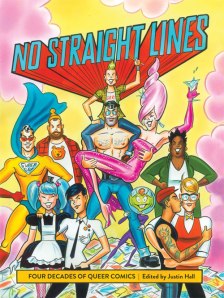
No Straight Lines. Image via Fantagraphics.
Justin Hall, ed. (2012.) No Straight Lines: Four Decades of Queer Comics. Seattle: FanTagraphic Books.
The introduction of No Straight Lines gives a useful history of what Hall defines as the three major periods of queer comics: “Comics Come Out,” which covers the underground comics of the 1970s-1980s; “File Under Queer” (1980s-1990s), which covers the beginnings of gay media and the AIDS crisis; and “A New Millennium” (2000s-2010s), which covers the rise of trans cartoonists and non-binary sexualities, gender expressions and gender identities, as well as how the Internet provided new opportunities for queer media to be produced and enjoyed by a wider audience.
What I love about this anthology is the diversity of topics. While there are coming-out stories and first-time stories, other topics include the domestic spats of a pair of leather daddies; butch women who love to knit; same-sex domestic violence (yes, it does happen and no, it is not adequately covered in DV training); love and sex and death at the height of the AIDS crisis; rejection of the status quo; self-loathing; self-love and self-acceptance; and let us not forget sexual awakenings and sexual misadventures. As Hall writes in the introduction, “queer creators will continue to hold up a fractured, funhouse mirror in which we LGBTQ people can view ourselves and allow others to see us as all”(n.p.).
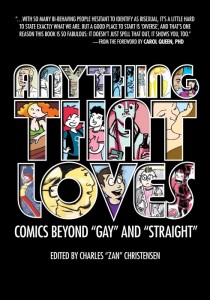
Image via Northwest Press.
Charles “Zan” Christensen, ed. (2013.) Anything That Loves: Comics Beyond “Gay” and “Straight.” Seattle: Northwest Press.
Which brings me to Anything That Loves, an anthology of comics about non-binary genders, identities, and sexualities. Reading this made me realize how rare it is to see comics and media where the coming out story isn’t “and then I realized I was gay.” These stories are about acceptance and identity that doesn’t fit neatly into a category, and these identities are often ostracized from both the straight and gay perspective. It’s the sexual/gender equivalent of “fake geek girl.” The anthology deals with genderqueer identities, bi erasure and stereotypes, trans relationships, the gender police, and platypuses. Yes, platypuses. Perfect analogy is perfect.
“Could the refusal to accept the existence of bisexuality, then, be a root cause of homophobia itself” by making others think that heterogamous or homogamous attraction is just something we can turn off and on? (10)
The true aim of the queer liberation movement, as I understand it, has been to affirm the right to determine one’s own ideal romantic and sexual life as well as one’s identity. The utopian ideal where everyone is free to follow their hearts (and libidos!) benefits everyone. Christensen writes of the gay side of the phobia,
Why do bisexual people in different-sex relationships have to be at the edges of our community, instead of actually part of it?… I think if we change the way we think about the queer community, stop thinking of it as a VIP club with a litmus test required for entry… (11)
I’ll spare you my extended X-Men metaphor about being queer, but suffice it to say that there’s no one right way to be queer, just like there’s no one right way to be a nerd. We can all be mutant and proud. I’m often afraid that discussing the importance of representation of all kinds of sexual minorities as validation leading toward tolerance and acceptance will cause some sort of Magneto-esque separatist to arise and be my lifelong foe.** Categories help explain who we are to others, but they also hurt and bind us down. We’re more than just a check box. We’re people.
Anything That Loves is a celebration of every kind of diversity, and it’s a great launching point into discussions of contemporary sexualities, identities, and genders as well as into contemporary artists, many of whom do webcomics!
Other queer comics of note
—and these are only a handful of everything out there!
A new Kickstarter for Qu33r: New Comics from 33 Creators!
Erika Moen. DAR!: A Super Girly Top Secret Comic Diary. Erika Moen’s autobiographical comic about her evolving sexual identity.
Fumi Yoshinaga. Kinou Nani Tabeta? The mostly domestic adventures of a lawyer who loves to cook and his hairdresser boyfriend. (Japanese)
—-. Ôoku. A genderswapped alternate history of the Tokugawa Shogunate. (Japanese and English)
Chiyo Rokuhana. IS: Otoko demo onna demo nai sei (IS [Intersex]: Neither Male Nor Female). I’ve seen the drama version of this but haven’t read the manga yet. When male-identified intersex child Haru enters high school, he has to do so as a girl because of the sex listed on his family registry. (Japanese)
Tab Kimpton. Khaos Komix. The coming-of-age tale of six LGBT British college students.
—-. Shades of A. A queer, diverse, feminist retelling of Fifty Shades of Grey, starring asexual Anwar, fabulous crossdresser Chris, and genderqueer JD.
Roslarian. YU+ME. Girl meets the girl of her dreams. (Spoilers, sweetie.)
Alison Bechdel. Fun Home: A Family Tragicomic. Superb story-telling and art describing Bechdel’s relationship with her closeted father.
Sam Orchard. Rooster Tails: A New Zealand Transman Comic Blog. Sam’s autobiographical comic.
And more at Prism Comics!
Notes
*or LBGTQIA. I prefer the umbrella-term queer, but not everyone does. See also the “Gay Sandwich” comic.
**I’ve met one or two “radicals” like this who had no room in the community for anyone deemed “not queer enough” by them, and good riddance, you are not worthy of my sweet X-Men reference.

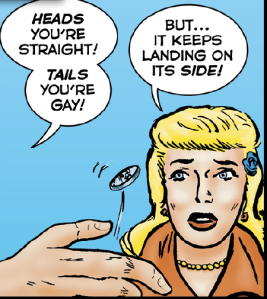
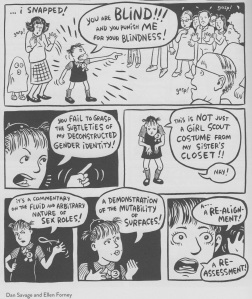
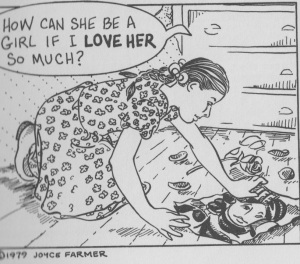
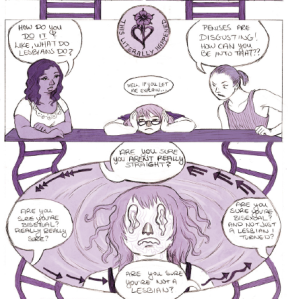
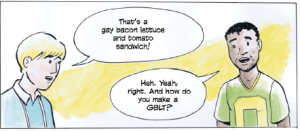
Reblogged this on The Lobster Dance and commented:
I usually focus on Japanese media on this blog, but I did a guest post over on Comparative Geeks today about queer American comic anthologies. Enjoy!
LikeLike
Looks like it’s a good thing you had this opportunity to step out of the Japanese culture reviews for a moment, just in time to get Freshly Pressed! Thanks for a great guest post!
LikeLike
Thanks for asking me to guest post! If anyone’s interested, I’m covering Geek Girl Con panel recaps for a few posts–once I recover more from the con, anyway. 😀
LikeLike
Pingback: “Wibbly-Wobbly Sexy-Wexy”: Queer Comic Anthologies | The Lobster Dance
Pingback: Cryptoquote Spoiler – 10/16/13 | Unclerave's Wordy Weblog
Thanks for yet another excellent post, Leah! And congrats on the guesting opportunity!
LikeLike
Thank you, and thanks for coming over here to read it!
LikeLike
Pingback: LGBT Book Club Selections (Aug-Oct 2013) | Licking County Library Book Groups
I have tried and tried but I can’t see anything good out of identifying people based on whom they have sex with or whom they love. It just doesn’t compute for me. We certainly don’t need yet another way to section ourselves off from one another. I love the way that many of the manga/anime seem to leave the characters gender up for interpretation it’s fun to imagine a world in which it really doesn’t matter.
LikeLike
Categories can be helpful as short-hand when dating, but I’m hoping too that someday it will matter less. Thanks for reading!
LikeLike
Role models, Role models, Role models or just seeing the occasional queer character in a media which you love.
A great resource of a post – thanks. Also Jane’s World by Paige Braddock in my ( extremely humble ) opinion is worth a look.
LikeLike
Thank you for the suggestion–I’ll check it out! I’m also a big fan of Torchwood and lots of other geeky media with queer characters and themes; most of my blog is about Japanese media, but I love hearing about new American media, too.
LikeLike
i love this!
LikeLike
Thank you for reading and reblogging! 🙂
LikeLike
Reblogged this on SoberVeganLesbian and commented:
I love this! so Interesting.
LikeLike
Pingback: Freshly Pressed: “Wibbly-Wobbly Sexy-Wexy: Queer Comic Anthologies” | The Lobster Dance
Congratulations on being Freshly Pressed!
LikeLike
Thanks for reading!
LikeLike
Excellent post and a great look at the hetero-normative culture we experience as english speaking people. There are Sci-fi, Dramas and comedies that I thought could benefit the addition of a gay mainstream character! To put it plain and simple though I simply just don’t identify with straight characters and I find it un acceptable when TV refuses to acknowledge LGBTQ in every channel.
LikeLike
For the last two years, I’ve basically been trying to sell Torchwood to everyone I know and praying the network gods will create more Iantos and Jacks. It would be nice to see more characters of any and all sexualities, identities, and gender expressions, and I’d love to see more of that instead of the token gay character. Thanks for reading!
LikeLike
Wonderful read!
Congrats on getting pressed!!
LikeLike
Thank you! I’m really pleased WordPress has been focusing on including more articles about inclusivity, especially on gender and race.
LikeLike
Unsurprising how bisexual folks are often treated the same way as I am, who has a sex drive the size of a lentil. Are you sure you’re not straight and just *salacious leer* scared of men? Are you sure you’re not lesbian and *condescending sneer* too chicken to admit it?
Actually, I am QUITE sure that the one thing I’d like to do right now is get the hell away from you chuckleheads.
LikeLike
Asexual folks (and people tending toward ace) definitely get the short end of the stick, too. Shades of A has really been fantastic so far, and it’s been a learning experience for me. Also, I love the expression “chuckleheads”!
LikeLike
Pingback: Freshly Riffed 53: What Am I Doing With My Life? | A VERY STRANGE PLACE
Congrats on FP’d!! Wonderful article
LikeLike
Thank you! Glad you enjoyed it.
LikeLike
Pingback: Thank You!!!! | Comparative Geeks
Reblogged this on PureTruculence.com by Queer1.
LikeLike
Reblogged this on #GingerLovin.
LikeLike
Reblogged this on nolifekate's Blog.
LikeLike
Reblogged this on Jess.
LikeLike
LOL
LikeLike
Pingback: 10 Great Things From Blogging This Year | DBCII
Pingback: The Writing Process Blog Tour | DBCII
Pingback: A Year and a Half of Comparative Geeks! | Comparative Geeks
Pingback: 2 Year Anniversary of Comparative Geeks! | Comparative Geeks
Pingback: Open Call for Guest Posts – Help Us Keep the Blog Running! | Comparative Geeks